Photographs: Courtesy: The Samajwadi Party Sharat Pradhan in Lucknow
The outcome of February's Uttar Pradesh assembly election could well determine if a mid-term poll to the Lok Sabha is possible in 2012.
In the first of Rediff.com's series on the political contenders in the states going to the polls early next year, Sharat Pradhan examines how Mulayam Singh Yadav's foreign-educated son is transforming the Samajwadi Party.
One could not believe one's eyes when page one of The Times of India appeared with a red and green advertisement promoting the Samajwadi Party on a cool November 22 morning.
A smiling and unbelievably affable Mulayam Singh Yadav showing you new hope through what he chose to call -- Ummeed Ki Cycle (cycle of hope).
While the cycle has been the party's traditional symbol, the Ummeed Ki Cycle depicted in the advertisement, appearing on Mulayam's 73rd birthday, clearly marked a turning point in the Samajwadi Party's history, a party notorious for bulldozing its way with blatant muscle power.
Party supremo Mulayam Singh Yadav, who had thrived with his image of a wrestler-turned-political fighter, did not come in the way of the effort to cast the party in a new mould.
Sure enough, that was because the harbinger of change was his elder son Akhilesh Yadav, whom he had not very long ago anointed as the Samajwadi Party's president in Uttar Pradesh.
Please ...
Mulayam Singh realised that time was running out
Image: The Ummeed Ki Cycle campaign posterPhotographs: Courtesy: The Samajwadi Party
So far, the only transition that the Samajwadi Party had seen was from muscle power to money power under the tutelage of then party general secretary Amar Singh, who virtually held complete sway, so much so that even suggestions were unwelcome from any quarter.
Amar Singh's dominance had led to an estrangement of Mulayam's old Socialist comrades like Beni Prasad Verma and Azam Khan, seen as stalwarts of the party in the pre-Amar Singh era.
What Amar Singh imported into the party, purported to be wedded to Dr Ram Manohar Lohia's Socialist ideology, was Bollywood stardom, which according to his claims, would do wonders.
Far from proving to be any shot in the arm, the Bollywood injectibles only brought short-lived euphoria, while gradually eroding into the fundamental strengths of the party and its Lohiaite leadership.
It also turned the once accessible Mulayam into another political aristocrat confined to his ivory tower.
Electoral losses and the party's sliding political graph dawned realisation on the Mulayam Singh that time was running out for him and his party.
It was that urge for change that gave birth to the Ummeed Ki Cycle -- to be championed by Akhilesh Yadav who is out to re-invent his father's party.
Please ...
'An era of open and free exchange of opinions'
Image: Akhilesh Yadav addresses a rally at Shahjanur, Uttar PradeshPhotographs: Courtesy: The Samajwadi Party
Once known for its rustic image with a flagrant disdain for anything modern -- more particularly the use of the English language, or computers -- the Samajwadi Party in its new avatar is busy exploiting every new technology to win the political battle in five weeks's time.
The November 22 advertisement explicitly talked about opening up of the party -- new ideas, new means, new communications and new horizons.
All this coming from a leader who had climbed up the political ladder by sheer dint of the skills he had learnt at the akhara (wrestling ring) in the badlands of Etawah, his home in central Uttar Pradesh.
This change in strategy was attributed to the influence of his elder son Akhilesh, whom Mulayam not only sent to an English medium school, but even as far as Australia from where the younger Yadav obtained a master's degree in environmental engineering at Sydney University.
Please ...
'Change is a process of growth'
Image: Akhilesh Yadav on a Samajwadi Party campaign posterPhotographs: Courtesy: The Samajwadi Party
"Change is a process of growth, so no single person can take credit for it," Akhilesh Yadav told Rediff.com.
"Who said Lohiaji was against technology or my father is against modernity?" asked Akhilesh.
"There were no computers in Lohiaji's time and as far as Netaji (that is how Mulayam Singh Yadav is referred to in the Samajwadi Party) is concerned, he was never opposed to modern technology."
"If today we are making use of technology in our election campaign," adds Akhilesh, "it is thanks to him."
Not long ago he got his father to launch the Samajwadi Party's upgraded Web site. Just before undertaking his Kranti Rath Yatra, Akhilesh displayed its route to Mulayam on his iPad.
"Netaji was quite impressed by the gadgetry," adds Akhilesh.
Please ...
Akhilesh has campaigned in 132 assembly constituencies sao far
Image: The Samajwadi Party Web sitePhotographs: Courtesy: The Samajwadi Party
The Samajwadi Party now has a Facebook page, a Twitter account, apart from its Web site, which has seen several upgrades since the 2009 general election.
A team of IT professionals updates the Web site on a daily basis.
The party Web site chronicled Akhilesh's Kranti Rath Yatra in great detail, pointing out that he covered 132 assembly constituencies during the first leg of his yatra in November.
The Kranti Rath Yatra may be a repeat of a similar yatra his father undertook in 1987, which eventually propelled him to power in UP for the first time in 1989.
But there is a subtle difference between the father and son's yatras.
Mulayam's yatra was meant to demonstrate his political clout; Akhilesh's yatra is aimed at mobilising support for the Samajwadi Party across Uttar Pradesh before February's assembly election.
"I have covered some 5,000 km on a specially designed automobile rath and some 250 km on a bicycle as a part of my door-to-door contact programme," Akhilesh points out.
Please ...
'Where are the goondas?'
Image: Akhilesh Yadav with supporters at a rallyPhotographs: Courtesy: The Samajwadi Party
"I see no reason why UP never thought of getting a big bicycle factory set up in the state, where its demand is huge," Akhilesh told Rediff.com
"The only proposal that came was during Rajiv Gandhi's time in his constituency Amethi, but no one cared to pursue it after his death," he says.
"If our party comes to power, a cycle and cycle-rickshaw factory would be the first thing to be set up, to provide good and cheap products to the common man," he asserts. "I have drawn up a blueprint for generating employment across the state."
"Besides promoting small and medium industries which would open new avenues for employment, the Samajwadi Party plans to play catalyst for large-scale self-employment in the rural sector, where much needed work will be done to promote agro-industry," he emphasises.
Akhilesh, it is said, has weeded out many undesirable elements from the Samajwadi Party. "Tell me," he asks, "where are the goondas that the media has been accusing us of harbouring?"
Please ...
'He is not just another neta's son'
Image: Akhilesh Yadav interacts with the mediaPhotographs: Courtesy: The Samajwadi Party
Akhilesh Yadav has been concentrating on the 80 assembly constituencies which the Samajwadi Party lost in the 2007 assembly election, by margins ranging between 500 to 9,000 votes.
"We have declared 392 of our 403 candidates for the assembly poll," he says.
"Other than 22, whom we may change on account of complaints, the rest have been in place for quite sometime. They are quite well entrenched and busy telling their constituents what the Samajwadi Party has to offer."
Apart from his father Mulayam Singh Yadav's traditional caste vote base, what the son has been busy tapping is those segments of UP society that steered clear of the Samajwadi Party in earlier elections -- the educated middle class and the state's youth.
Devendra Kumar, a third year electronics engineering student, feels, "The youth will prefer someone like Akhilesh Yadav, who is not just another neta's son, but who has an education and displayed the capability to do things."
Please ...
'Time to put the bitterness of the past behind us'
Image: Samajwadi Party supporters at a rally in Malihabad, UPPhotographs: Courtesy: The Samajwadi Party
What seems to add up to Akhilesh Yadav's ummeed (hope) is the increasing incumbency factor against Chief Minister Mayawati and her Bahujan Samajwadi Party, a rudderless Bharatiya Janata Party and the Congress party's fast eroding goodwill.
Akhilesh prefers not to follow his father's political style of confrontation. Recently he not only reprimanded partymen for attempting to disrupt Congress General Secretary Rahul Gandhi's rally in eastern UP, but even sacked the local Samajwadi Party leader who led a bunch of youth to wave black flags at Rahul's motorcade.
"It is time for us, the people of Uttar Pradesh, to put the the bitterness of the past behind us, "he says, "and look forward to days of new hope, of a new ummeed."

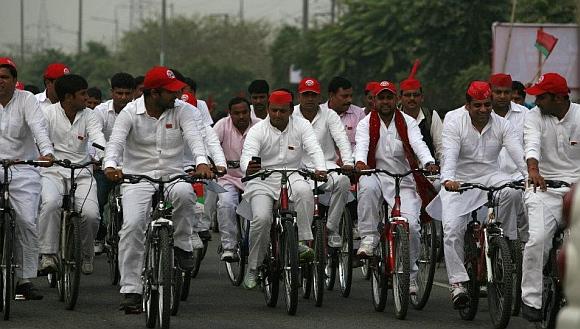
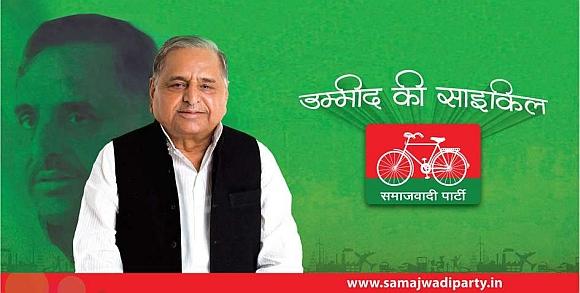
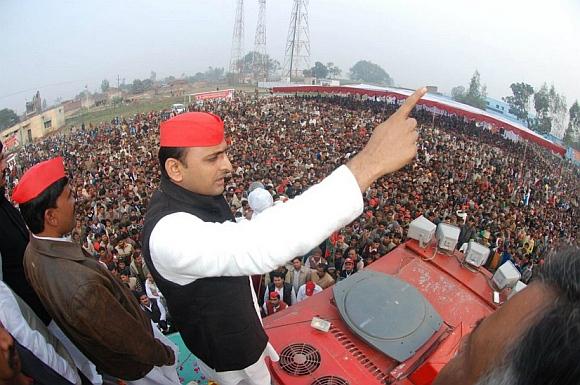
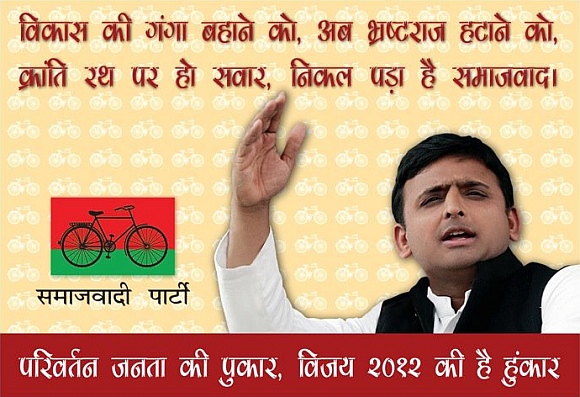

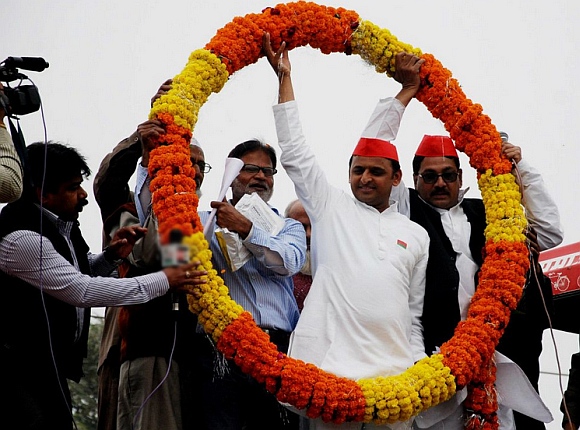

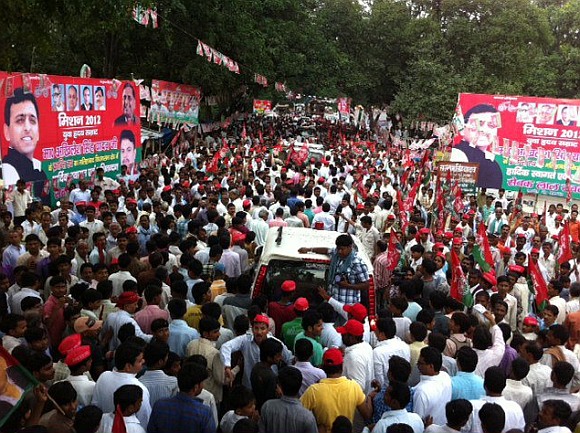
article